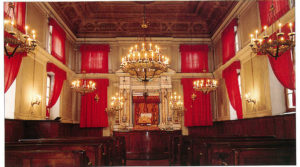FEATURES Pisa, the Jewish Heritage by the Leaning Tower
The city of Pisa, Italy is one of the centers of European medieval art and home to impressive architectural structures. The Piazza dei Miracoli (Square of Miracles) is home to four Catholic monuments: the Cathedral, the Baptistry, the Campanile (known in English as “the leaning tower”), and the Monumental Cemetery. But few people know that Pisa has played a very significant role in the Jewish heritage of Italy.
It is thought that Pisa is the first city in the Tuscany region in which Jewish families settled. Historical records show the purchase of a house by a Jewish merchant in the year 850. Another telling piece of evidence is Benjamin of Tudela’s account of his journey from his native Navarre to Jerusalem. In his book he mentions that he came across 20 Jewish families living in Pisa when he stopped there in 1165 on his way to the Holy Land.
During the mid-1300s, the Jewish community of Pisa grew with the arrival of refugees from Spain and Provence who had been expelled following the bubonic plague for which they were blamed. During the 1400s, A Jewish family known as the “da Sinagoga” family whose surname was later changed to “da Pisa” arrived in Pisa. This family established a bank that became famous in the region for banking and patronage. The bank spread throughout Tuscany and eventually the family formed close ties with the Medici family, the great Florentine banking dynasty. The Medici bank (the largest in Europe during the 15th century) had significant political influence throughout Tuscany. The support of the Medicis gave rise to prosperous times for the Jews of Tuscany which led to a growth in the population of Jews toward the end of the 15th century.
This period of relative tranquility did not continue indefinitely. Struggles for power between the Medici family and the Florentine Republic, and the Italian war of 1494-1509, led to a very difficult environment for the Jews. In yet another reversal, Duke Cosimo I came to power in 1547 and invited Sephardic Jews to settle in Pisa and the new port city of Livorno. With the entrance of the French under Napoleon in 1798 the Jews were accorded full citizenship. The Restoration of 1814 acknowledged the independence of the community and the ghetto was abolished.
Before the Holocaust, the Jewish community of Pisa consisted of 535 people. During the war, 12 Jews were sent to extermination camps and 8 Jews were deported from the city. In 1944 the Nazis murdered a Deputy Major of Pisa, Giuseppe Pardo Roques. He was an esteemed Jewish philanthropist and president of the community. Six Jews who were in hiding in Roques’ house were murdered, as well. The story of Pardo Roques and his tragic end is movingly recounted in Silvano Arieti’s book, The Parnas. Today the Jewish population of Pisa is between 100 and 200 people
While Pisa is known for its Catholic architecture, there are also some beautiful Jewish tourist sites in the city. For starters, the city’s synagogue is a major attraction. From the outside, it appears as just another house along the street, but the interior architecture and decoration is dazzling. The Vitale Da Pisa Mansion is another popular site. It served as the home for the Da Pisa family, as well as a bank, and a synagogue.
Finally there is the Jewish cemetery. Located just outside the square, the cemetery was established in 1648 and is one of the most ancient in Europe. The oldest stones are still standing, with Hebrew inscriptions on one side and Spanish or Portuguese inscriptions on the other, attesting to the Iberian origin of the families. Surprisingly, this cemetery is still in use.
Pisa contains priceless pieces of Jewish history in Tuscany. It may be known for its Catholic edifices but upon closer inspection it reveals its Jewish treasures, as well. The members of the Jewish community all profess one religion, but they’re ancestors came from all over Europe. I encourage readers to research the Jewish migration to Pisa and the remarkable Da Pisa family.
*Austin Marques is a student at Muhlenberg College (Allentown, Pennsylvania, USA).

